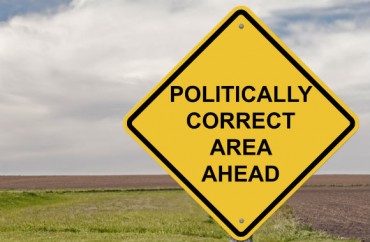
Debating transgender identity ‘isn’t the most sensitive, socially conscious thing to do’
A University of Northern Colorado student who works closely with its Bias Response Team believes the team’s work is widely misunderstood.
“To me, it seems that most of the people decrying this group think of it as some sort of punitive task force, going around and enforcing the ‘[politically correct] Culture’ and trampling on the first amendment,” Griffin Pierce told The College Fix in Facebook messages.
“[I]n actuality,” the BRT is “dedicated to making our campus a safer, more welcoming, and more inclusive place,” said Pierce, who is not a member of the team.
MORE: Professor investigated for playing ‘devil’s advocate’
The university came under scrutiny last month after a BRT report was published, showing that adjunct Prof. Mike Jensen had been investigated for playing devil’s advocate in a freshman composition class.
A transgender student had complained about a class discussion, led by Jensen, that used The Atlantic article “The Coddling of the American Mind.” According to the student, Jensen explained the opinion that “transgender is not a real thing.”
‘Social Justice, inclusion, and equity’
Pierce got his impressions of the BRT by working with “a couple members” of the team on creating a curriculum “centered around Social Justice, inclusion, and equity.”
He declined to say what his exact job is that connected him with the BRT, except that it’s a departmental job on campus. Academia.edu lists Pierce as a member of the sociology department.
Pierce’s thoughts in some ways echo those of UNC President Kay Norton.
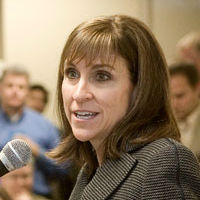 Two weeks ago she told the community that while “our process and intentions” have been mischaracterized, the university will stop any future “inappropriate effort to influence” classroom discussion, as suggested by some bias reports.
Two weeks ago she told the community that while “our process and intentions” have been mischaracterized, the university will stop any future “inappropriate effort to influence” classroom discussion, as suggested by some bias reports.
Jensen was not retained by UNC for the spring semester, but it’s not clear whether the bias complaint was a factor in that decision.
In a meeting to discuss that complaint, Human Resources Director Marshall Parks had told Jensen that any class discussion of opinions on transgender issues could be perceived by students as discriminatory.
 Parks – also the ethics officer for Title IX, affirmative action and equal opportunity – advised Jensen to simply avoid transgender topics so he wouldn’t be investigated again, according to a recording of the meeting made by Jensen.
Parks – also the ethics officer for Title IX, affirmative action and equal opportunity – advised Jensen to simply avoid transgender topics so he wouldn’t be investigated again, according to a recording of the meeting made by Jensen.
The professor later said he self-censored “constantly” in the meeting with Parks so that he wouldn’t have to come back for another meeting.
Neither the university nor Parks responded to Fix requests for comment.
Going off-script with ‘clients’
In his Facebook message to The Fix, Pierce shared his view of what Parks should have done.
“Instead of simply telling the professor not to discuss that in class, they could have perhaps asked the professor why they thought that was something the class needed to debate,” Pierce said, “and maybe then explained why having a debate on that subject isn’t the most sensitive, socially conscious thing to do.”
MORE: Professor self-censored ‘constantly’ to avoid another bias meeting
Pierce believes that professors need to “report back” what they are teaching to both faculty leadership and administrators.
“[I]f a professor is discussing subject matter that conflicts with the values of the university, I don’t think that it’s too much to ask for the governing bodies of the universities, or those that they appoint, to have [t]hose conversations,” Pierce said.
He likened it to the leaders of a company having a “dialogue” with a representative that was “saying things to clients that were at odds with the mission of the company.”
It’s not clear if UNC’s Faculty Senate will follow the lead of the University of Oregon’s Faculty Senate, which launched its own task force to investigate how that university’s Bias Response Team affects “free and open classroom discussions.” UNC Senate officers did not respond to Fix inquiries.
Language missing: UNC ‘will not seek to discipline or prosecute’
UNC’s Bias Response Team has become less forgiving of those who offend others over the years, as shown by its official web page.
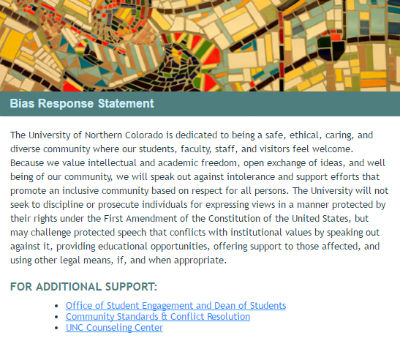 Screenshots from the Internet Archive show that from May 2010 through April 2015, the BRT page promised UNC members that the school “will not seek to discipline or prosecute” anyone for speech protected by the First Amendment.
Screenshots from the Internet Archive show that from May 2010 through April 2015, the BRT page promised UNC members that the school “will not seek to discipline or prosecute” anyone for speech protected by the First Amendment.
Instead, the university “may challenge protected speech that conflicts with institutional values by speaking out against it, providing educational opportunities, offering support to those affected, and using other legal means, if, and when [sic] appropriate.”
That language disappeared from versions of the page starting in June 2015, while retaining the sentence right before:
Because we value intellectual and academic freedom, open exchange of ideas, and well-being of our community, we will speak out against intolerance and support efforts that promote an inclusive community based on respect for all persons.
MORE: Lawmaker warns Colorado university about regulating speech
The versions from the past year also added urgent language: “We encourage any person who has experienced and or [sic] witnessed a bias motivated incident to report it.”
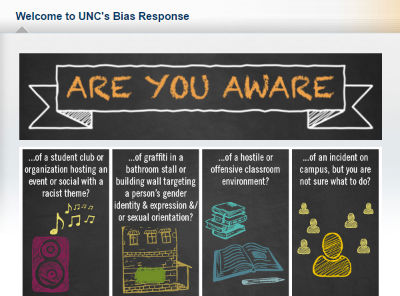 The top of the BRT page for the past year has featured a graphic that shows four scenarios – two specific and two vague – that could be the subject of a bias complaint.
The top of the BRT page for the past year has featured a graphic that shows four scenarios – two specific and two vague – that could be the subject of a bias complaint.
President Norton’s own mission statement shows the tension between freewheeling classroom discussions and students’ feelings about different viewpoints.
It says the university “is committed to promoting an environment” where “teaching and learning flourish; diversity of thought and culture is respected; intellectual freedom is preserved; and equal opportunity is afforded.”
Language should ‘never be perceived as punitive’
Asked whether the targets of the BRT should face discipline, Pierce said, “I don’t know if there should be any ‘discipline’ surrounding any of these cases. I think that’s where so much of the misconception is coming from.
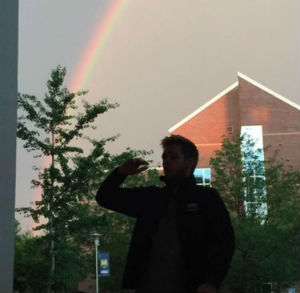 “The intent should not be to discipline people that say problematic things,” Pierce continued, “but rather to open up lines of discussion with those people about WHY it’s problematic … through education and discussion.”
“The intent should not be to discipline people that say problematic things,” Pierce continued, “but rather to open up lines of discussion with those people about WHY it’s problematic … through education and discussion.”
MORE: Oregon says its bias team isn’t ‘Thought Police’
However, it would be “a good step to take” for the university to not consider bias-incident investigations “when renewal/hiring time comes around,” Pierce said.
“I think it would be good to re-evaluate some of the language used to make sure it’s never perceived as punitive action, but rather as educational.”
UNC has made a few changes in the meantime, as noted by the Foundation for Individual Rights in Education.
The school deleted an FAQ page about the BRT that explains why a person is being investigated and how and when a person can file a complaint. It also added the phrase “conflict coaching” to a page that describes the BRT’s goals.
FIRE did not respond to a query about whether it is assisting UNC in revising any policies related to bias incidents, as the advocacy group often does with universities.
Pierce predicted that BRT members will “pick their battles more carefully” after this controversy. “It’s definitely a new program, and there will be missteps with any new policy program.”
MORE: Oregon professors look critically at Bias Response Team
Like The College Fix on Facebook / Follow us on Twitter
IMAGES: Shutterstock, Academia.edu screenshot, Karl Dukstein/Flickr, University of Northern Colorado screenshots, Griffin Pierce/Facebook


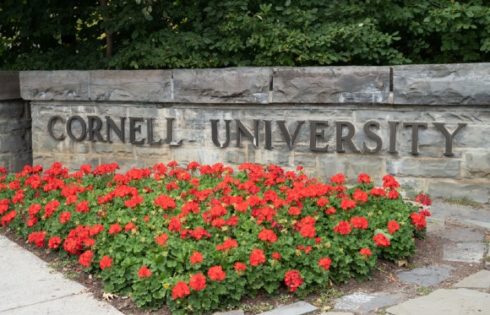
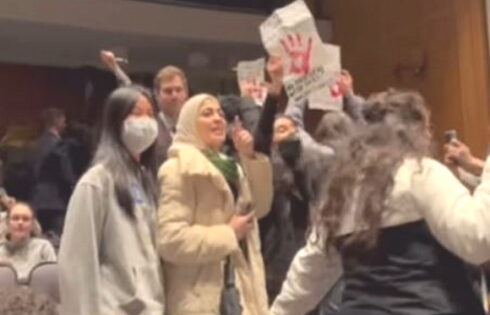


Please join the conversation about our stories on Facebook, Twitter, Instagram, Reddit, MeWe, Rumble, Gab, Minds and Gettr.